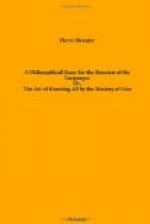Words being in the opinion of all men but significant sounds, they may be taken either as they are Natural sounds, or arbitrary signs, I would say, either as they are the proper effect of the motion of our organs, or as the lively representation of the thought of our minds. And since they make their passes from one Language to another they cannot well admit of any alteration in this their transit but in three respects; for whatsoever change be suppos’d it will necessarily fall out, either in the sounds themselves that compose the words, or in their significations, or in their different modifications, and its from these three distinct regards that the generall principles have their rise, upon which I have fastn’d this new Systime of the Philosophie of the Languages.
That I may make my procedure more justificable and artificiall, I examine with all exactnesse the different organs of the voice, the various motions of the muscles belonging to these organs, and the admirable concent and accord of those motions; and these I make use of to demonstratively explaine the precise number of all the simple sounds, that enter into the composition of the Languages, to discover the nature and proper pronunciation of these sounds, and by consequence to disclose their nearnesse and affinity, the resemblances of some, and the disproportion of others, their accord and opposition, their Sympathy and Antipathy, in a word, all their combinations and mixtures, their divisions and distinctions, their orders and severall degrees. From whence I conclude that all the astonishing and surprizing depravations and Corruptions that are met withall in the words that one Language borrows from another, in changing or in transposing, in adding or retrenching, have their basis in nature; which never attempts any thing but to the purpose, and with a sollicitous care, when to us it appears to have acted with an open and observable neglect.
We may Study Nature upon the Latine it selfe which may serve as well for a model as it doth for a principle; It will in the first place acquaint us that the Vowels are almost accounted for nothing, for altho there are some of them that admitt of easie changes among themselves according as they are more open or reserv’d, we know neverthelesse that there are none of them but what may be absolutely shifted into the place of another of what kind soever, either immediately, or by succession and degrees. For a finall confirmation of this we have no more to doe but to make an easie comparison of the different derivative of the same word, the reference of these three Cepa; incipio and occupo, to the Verb Capio may serve for an instance, if we shall but grant the truth of this principle which the orientalists have always suppos’d, who form the greatest part of their words from the sole change of their Vowels.




